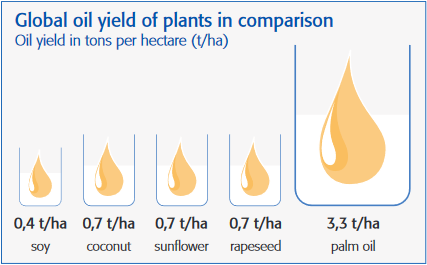
Advantages of Palm Oil
Palm oil is a versatile raw material used across various industries. Approximately 78 million tons of palm oil are produced globally each year, the majority of it in Indonesia and Malaysia.1 For the oleochemical industry, the fatty acids derived from palm oil or palm kernel oil are among the most important raw materials.
The palm oil industry faces significant challenges. The environmental impacts of cultivation, such as deforestation and the accompanying loss of biodiversity, are major points of criticism. It is essential to accelerate the sustainable cultivation of palm oil, an effort supported by initiatives like the RSPO and FONAP since many years.
However, compared to other oils, palm oil offers several advantages. Due to its chemical structure, it is particularly well-suited for the diverse products and applications within oleochemistry. Another benefit is that the cultivation of oil palms yields two important raw materials at a time: palm oil and palm kernel oil. One of the most significant advantages, however, is the high yield: palm oil has the highest land yield compared to other vegetable oils - see figure². Therefore, producing the same amount of other vegetable oils would require significantly more land.

Despite all the challenges, palm oil remains an indispensable raw material for many industries. It is the responsibility of all companies along the supply chain to ensure that sustainably sourced palm oil becomes the global standard.
Sources:
1. FONAP website, forumpalmoel.org/en/about-palm-oil/
2. WWF Study 2016: Palm Oil Report Germany. Searching for Alternatives.


